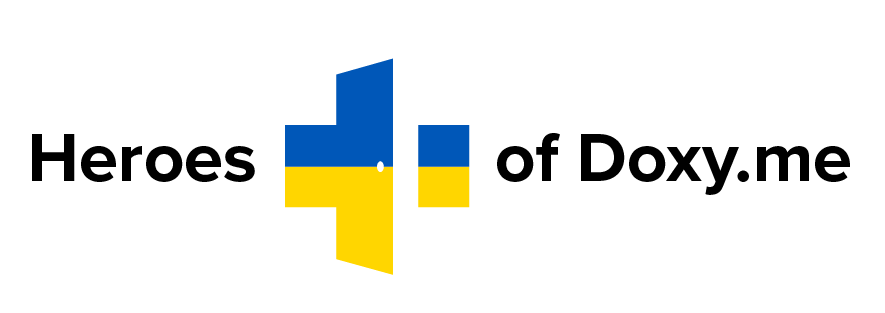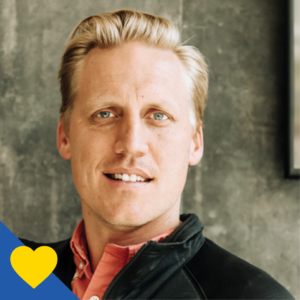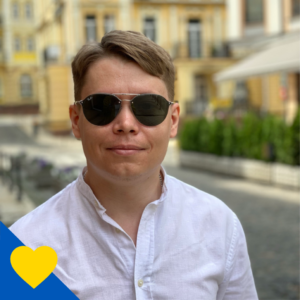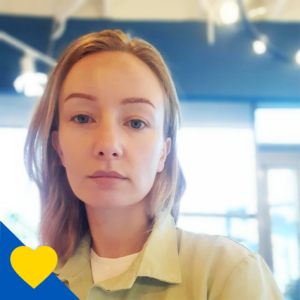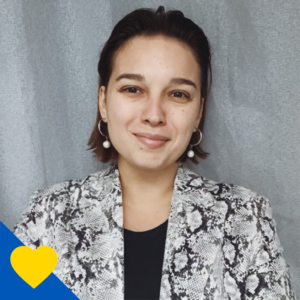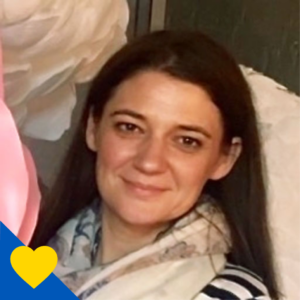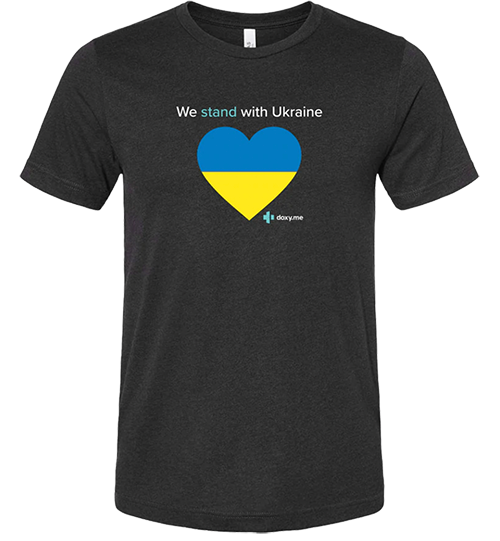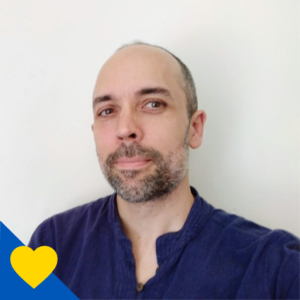
Heroes of Doxy.me: An American Living in Ukraine
Doxy.me CTO Heath Morrison recounts when and how he fell in love with the country of Ukraine, and shares his unique perspective on the war as an American who’s lived in Ukraine for many years.
View Episode Transcript
Mary:
So we were talking about your role in Ukraine. So you were, you were talking about how you moved to Ukraine in 2010. Do you want to just tell us how you chose Ukraine?
Heath:
Yeah, so I’m an American, I, I, and I was living on the west coast and I, I was managing a team of developers in Ukraine for a company back, you know, back at the time. And, and I found that to be really hard. There’s a 10 hour time difference between the west coast and Eastern Europe. And, and I, I decided to go spend three months in Kia with my team. And when I did that, it was a really a wonderful experience. And I, and I was so much more effective in that role when I was on site. So at that three months turned into six months, turned into one year, turned into two years of, you know, at some point you realize you’re, you’re living somewhere and you’re not just on a business trip and, and yeah. You know, at 12, my mind hold up.
Heath:
So I, I, I found at that time, I, you know, I really fell in love with current a country that has, has inspired me. And, and so when I met Brandon in 2016, I, I was very much established there and he was working with developers and other parts of the world at the time. And, and as we started working together, you know, we, I helped him to find developers in, in Ukraine, both for our business and, and products, products we were working on, but also on for Doxy.me, which I was not involved with at the time. So, and then in 2020, when I joined in full, we, we had a plan to grow the team and we started growing the team in Ukraine. And of course when happened, we, our company grew considerably and we were positioned to, to grow and in Ukraine and we, we grew from about us three people there in January 20, 22, some 45 or 48 people that we have right now. So
Mary:
So please describe what the last, not the last two weeks have been like, but say starting the beginning of 2022, what has the mood, what was the mood like in Ukraine?
Heath:
Yeah, it’s been, so, yeah, really at the end of 2009, 2021 and beginning of this year, w 20 2022, we, we started to take more notice of what was happening with the Russian buildup on the borders, because it’s seemed to start to enter into a phase that was different. I should say that, you know, we in Ukraine have, for years been threatened by the, by the Russians, they each year had done something similar where they built up troops on the border or made some kind of, you know, escalation of the conflict in the east. And so you, crane has, has been careful not to panic in those, in response to those things. So, and, and, and even though, you know, there has been a war really already in, in Eastern Ukraine since 2014, you would never feel it in key of you. There was a, I think, a determination to, to build the country and, and, and live life like normally, and, and to sort of keep that, that conflict isolated in the east and, and everybody really endeavored to embrace that and not to, not to sort of be shaken or, or, or, or respond to kind of the threats that were, it seemed where we’re coming from Russia, you know, year after year.
Heath:
So, so even as early, as middle of last year, there was a buildup of troops on the border and we observed it and we were aware of it, but we, we, you know, we were careful not to respond to over respond to it, but in the beginning of 2022, we, it seemed to be going to, to be much bigger than that. And the American government started to issue some warnings. And as a, as a, you know, I, I’m kind of positioned in a, in a unique place because I both, I understand I’m living in Ukraine and I understand how all the Ukrainians feel about the situation. And at the same time, I’m an American I’m consuming a lot of American media and I pay it. And I talked to a lot of Americans. So on, on one hand, the Ukrainians were just dismissive of it, to be honest, in early 20, 22, not to panic, not to overreact, this is not, this is just saber rattling or what not, and the Americans were increasingly concerned.
Heath:
So we, I worked with my leadership team in Ukraine to put together a disaster response plan, just to kind of protect ourselves against the potential of a conflict, a real conflict emerging. And, and through the end, most of our team did not really a concern themselves too much for this. We surveyed our staff a couple of times to kind of understand their willingness to relocate or their kind of level of, of concern. And, and I think the first time we only had four or five people even respond to the survey. Like it was a very low concern concerned to people, but nonetheless, we put together this emergency response plan that involved leasing and like a kind of mixed sort of apartment office space in it, and in Western Ukraine and, you know, allocating some funds and, and other other factors kind of to sort of respond to what we viewed at the time was a worst case scenario.
Heath:
And, you know, honestly until probably we would have to check the exact dates, but until it was probably February 21st or second, when Putin gave a speech, a very, very disturbing speech where he spoke explicitly about the, you know, his dismissal of the, the, kind of the premise of the sovereignty of Ukraine, like before that speech, most of our colleagues still felt like this, that the Americans had been, or were overreacting, that there were, you know, it was a geopolitics and that there was that something like this could not happen. And none of, you know, most of our colleagues had not taken any efforts to be prepared in the case of something like this. And, and then Ukraine prior to, prior to that point, really, I talked to my neighbors, you know, they were aware everybody’s aware of the, of the troop buildups and the risks that were, that seem to be happening.
Heath:
But, but the, there was a lot of, you know, the messaging from the government was, was everybody should, you know, your sort of social responsibilities to stay calm and to not panic. And, and people felt like, like there was deliberate efforts by the Russians to cause panic, you know, and that, that may even be their ultimate goal was just to cause panic and costs economic crisis and what a girls. So, so people were, were, you know, quietly aware of the conflict, but, but it was, it was the socially kind of like UN thing too, like right. Thing to do was to not panic was to live your life and, and to sort of defend Ukraine by being unified against, against the, the, the threats. Right?
Heath:
Yeah. But, but an eerie thing that we noticed, you know, like I noticed that myself and I talked to some friends and it was observed as well, that like in probably the first week of February, the key of sort of slowly was becoming less busy. Like there was, the traffic was a little better, you know, the, the, the stores were a little less busy. You know, you had the sense that, that people were sort of quietly, those who were ready to maybe who were, were, were responding or were, were, felt, felt a little more concerned about the cough. The risks were slowly maybe taking themselves and putting, moving to a summer cottage or, or maybe taking this time to take a vacation. And it was like, the city was started to, to kind of have the sense that it was getting more empty. So there was like, I had this feeling at the time that even though people felt like maybe this social duty to, to be strong and not panic, that there was still this, maybe he less visible, like concern at least from a segment of the people.
Mary:
What were you doing at that point?
Heath:
So with, but we were also really paying a lot of, so I, with my family in late January, we sort of identify what our like, line was, what we were, what we felt was the line that would, that, that the indicator we would use to, to, to decide whether we should do something different. We did kind of put some time into just preparing, you know, we, we put together some supplies, we got our documents in order and just, you know, sort of prepared things in case we would decide to leave. And we have some friends in, in different, large international organizations and including like some UN organizations and, and we, we decided we were going to watch what those organizations are doing. And if those organizations started to remove their staff, then we would, we would follow in suit. So, and that is, that is what happened actually.
Heath:
So around February, it had to been like the 12th or 13th notice on the 13th, we ended up in response to something that one of these organizations did. We, we decided to relocate ourselves to Lviv, which is in Western Ukraine. And we, you know, we just packed up some stuff. Like we were kind of had the mindset of being about a two or three weeks. Right. That was sort of level of preparation we did. And we drove to Lviv and we were there for a week. And when we first got there, we were one of the first peoples there. And we’d, you know, our friends thought we were panicking and, or overreacting, and our colleagues thought we were overreacting, but we, we spent about a week there and we were happy to be able to be, but then, you know, things unfortunately escalated much further. And we were very grateful that we were prepared. We, we were in Leviev when the war started and we, we put on Poland. So
Mary:
We,
Heath:
You know, that’s fine.
Mary:
What day did you do that?
Heath:
On the 24th.
Mary:
Wow.
And what has it been like for you to be so far away from your home?
Heath:
It’s, it’s not the distance exactly. Because, you know, we travel a lot and we like to be abroad. Right. But the context of it is, has been really difficult, even though we were one of the first people to leave the country, even though we were prepared and we had sort of thought the stocks through beforehand, the like psychological and emotional burden has been very, very hard. And particularly, I think the thing that’s, we, we feel very connected and very present with the, with the war, even though we are, we are awake. And even though we had not have not gone through some of these terrible sort of trials and troubles that our friends and colleagues and part of that is because we are, we’re so closely connected with people. We are in some chat groups, you know, that people in Ukraine right now use several tools, like communication tools to stay in constant communication.
Heath:
And, and, and there’s these chat groups where we’re a part of, sorry, in the chat group of many foreigners that live inUkraine and then another chat group with all our colleagues, I’m in several that are like, you know, there’s a newspaper that I follow and they have like a group of people communicating and, and, and we’re in a group with our neighbors, youknow, so all our neighbors on our street in queue, and we have just watched this conflict emerged through this, through these communication channels. And it’s all real time and unfiltered. And, and that has been, that’s been really hard. Every time there’s a air raid siren in Kiev, my neighbors right onto this check group that there’s an Eric, sorry, they need to go into their, their cellar. And that is, you know, that, that has happened between like three times to like 15 times a day for most of the last two weeks.
Heath:
Right. I had a very, a surreal experience, you know, 10 days, but like towards the beginning of the war where we had, we were in Poland and we were kind of trying to get just sort of just this, this is like two days after we left, or one day we were just trying to get acclimated. And I went out to dinner and we were sitting at dinner in this restaurant in Poland and had a glass of wine and we were chatting. And, you know, the people in the room were, you know, glasses are clinking and people are laughing. It’s just a completely normal like dinner experience. And I glance at my phone and on this chat with our colleagues, somebody is writing, there’s an air raid siren in Kiev. And, and one of our colleagues, Peter he’s, he’s writing a, what do I do? I’m like, what do I do?
Heath:
And, and, and our other colleges like Peter, you need to go to the bomb shelter. And Peter’s like, I don’t know where the bomb shelter is. I don’t know where it is. I like what I do. And somebody was like, here’s a map, Peter, you have to go like that. And like, this is like all unfolding directly in front of me in real time. And at the same time, like I’m in this restaurant and it, and it’s like a completely different world and it was, it was surreal. And it was a really difficult, like, like I felt like I’m like literally watching these people that I know very well, that I have very close, personal relationship with struggling with this really difficult, dangerous situation. And, and all I can do is sit there and watch, like, there’s nothing I can do to help. And, and at that time, you know, we had, there’s so many terrible stories of people having, like from, you know, people being trapped on the highway or people, people not, you know, people trying to escape different parts of country that are, that were under direct attack or places that I know very well.
Heath:
Thank you. Being bombed and destroyed like symbols of, of the city, symbols of the country being just brutallydestroyed, or our colleague, you know, Natalia who cross the border with her kids and, you know, on foot walking 12 kilometers in the night and, you know, it was just, it, it it’s, it, it has, it has been, even though I have not personally had to go through those things, I feel the burden of them very directly, because these are, it’s also real because these are people that I have spent two years working and talking to every day. Yeah.
Mary:
So he of the, of the 48 employees, do you have a sense of how they’re distributed right now, where they are?
Heath:
Yeah, we have a good sense because we have a spreadsheet with, we’ve been very fortunate to have put this effort into this emergency response, because it really prepared us to help our staff as much as we could. And, and part of that is we have different people who were already in living kind of as a precaution. And then they were put into motion to sort of act as coordinators. And we have a spreadsheet that tracks, I would have to pull it up to get the exact numbers. But at this point we, you know, the majority of our staff are, so we have maybe like 12 or 13, those people are in what we call green zone, which is out of Ukraine. So that’s, they managed to go to Western Europe or Turkey or somewhere if I recall correctly, there’s another like 30 or so that are in like yellow zone, which means they’re in Western Ukraine.
Heath:
They’re in like, it’s safe now, but it’s still like, you know, the conflict, that’s not conflict changes, you know? So they’re inWestern Ukraine, maybe they’re in the Carpathians, which is the mountains there. And then they’re sort of in some , they have like maybe found a place to stay and whatnot. And they’re also maybe have internet and whatnot. And then we have another, it’d be like, like I’m getting the number’s a little off. There’s like, there’s maybe like, there’s, I think five or eight people that are in what we call red zone, which means close to the complex there in Kiev, like OBS, which is sort of the region, but they’re not like directly in the, Like, and, and there was one person who was like, really, who I believe is still in Kiev, but he has, he intends to leave still. So I think that we’re really down to just one person that we feel is in, like in imminent danger
Mary:
When you talk to people in the states about this conflict, what is it that you want them to know That you can share with us because of your unique perspective?
Heath:
When I, when I went to Ukraine, well, actually when I started to travel a lot, I was one of the biggest things I took away from. And I’ve traveled quite a bit to some 60 something countries. I’ve spent a lot of time just in all sorts of places. And one of the things I’ve taken away from that is that when you go to different countries, even the most, you know, different from, from our world in the US fundamentally people, people want the same thing. Like they want to, they want to live, they want to be close with their family. They want to have gainful employment. You know, they want to, to celebrate the important things in their lives. They want to have a secure home. And that that’s true. It’s just everywhere.
Heath:
When I, when I looked at many things about the country that were appealing to me, and that was quite different from the US right. I, but, but I have grown to see that Ukrainians are really fundamentally, very similar to, to Americans there’s and Ukrainians, culturally also are very, they understand Americans, Americans understand Ukrainians, and there’s a great kind of sense of, of understanding there. And, and I think, I guess like sometimes in the U S we see these conflicts abroad and it’s, it, it looks like another world, I guess. And I can’t emphasize how much, if, if on average American would find themselves in, in Kia, how similar that space would, would, would seem that it’s a S it’s a city with coffee shops and, you know, and supermarkets and, and, and everything else. And yes, it has its European charm and everything else, but it’s, it’s very, it’s a very recognizable place.
Heath:
And it, it really gives you the sense that these are people that are living their lives very, just like people in the U S and they were facing this really horrible experience or in a way that I think is very, very understandable. And so I it’s sometimes when we see these things on the, on the television, or we see these, you know, you see a lot of things on fire and a lot of, you know, people, and it almost starts to look like a different place, but you have to understand that those spaces were, were very normal spaces just two weeks ago. This is like, just apartment it’s. Yeah. Right. I also would like to mention that there is, you know, well, I actually attended a rally here in salt lake last weekend in support ofUkraine. And I was, it was a really interesting experience because I, I, I saw your Ukrainians there.
Heath:
They were Ukrainian Americans, and they’re also just, you know, Americans there, and, and there were in Ukraine, there’s different sort of things you’re accustomed to seeing with these rallies, like whether it’s protests or, or just kind of, youknow, people sort of, there’s certain things, people sit like sort of call, call out and, and, and, and say, and, and, and at this rally in salt lake, there was, there were, there was that. And then there was this also kind of uniquely American take on it. And there was a lot of talk about freedom and a lot of talk about independence and a lot of talk about sort of persevering under this, you know, this Imperial force that is trying to take the country or control the country. And those are all very understandable American concepts that are, are very accurate for this situation. You can, it’s a very understandable conflict to Americans.
Heath:
I think that because Ukrainians really, they also view it that day. Also see it about independence, about freedom, about their ability to, you know, live in their country the way they want to live and to form their own social identity the way that is according to their, their, their wishes. And, and so I think that while it struck me that that was a very American sort of angle on the rally, it also struck me that that is that Americans have, have kind of a deep intuition to understand this conflict in a way that is accurate to Ukrainians in a way that maybe other countries don’t or other cultures. So, yeah, I, yeah. Yeah. And president Zelensky said something some, some days ago, or at the beginning of the conflict that really, you know, and he said, it’s several times, it really struck me and it’s really true.
Heath:
And it’s just how the Ukrainian spirit, they, he said that like, they’re on their land. They’re, they’re people, and they’re not, they have no desire to, to hurt anyone. They don’t, they’re not trying to attack anyone. They’re not trying to conquer anyone. They just want to form their culture and their country and their society, according to, to, to what they are. And, and, and it’s, it, it is so true. And it, it directly, it was, it felt so accurate because it matches so closely. My understanding it’ll be Ukrainians in there and they’re kind of endeavors and wishes in this.
Mary:
Heath, how do you keep your emotional equilibrium during this stressful time?
Heath:
Honestly, it has been very difficult and I, my family and I have been in, we drove to pull in and then we drove to Vienna and we have rented a Airbnb in Vienna. And, and I thought, once I get to Deanna, I would have some stability and I would start working and kind of things would be, yeah, I feel like I have this. I am expected from my team to be, youknow, to be a leader and to be present and to be, you know, competent. And I know it’s been really difficult for me at this time. I spend a considerable one more time watching the news, checking in with people and, and, and really in this just feeling distraught. It, it has been, it has been a challenge for me, honestly. And as, I mean, this week is a little better. I’m here. I came here to meet with my colleagues in the executive team of Doximity and, and we, you know, they’re taking all my mental, mental energy to talk about business and things.
Heath:
Yeah. The distraction. But, but it has honestly been very difficult. And, and I don’t think I have a good, good approach to, to maintain that equilibrium. And I suspect that many people in our team feel the same way. I think that some people, well, I guess everyone has their own way of dealing with things. Some people have poured themselves into work and they’re even, and some people are really motivated to be like, you know, they’re, but I suspect many people have this burden on them. And sometimes when I talk to my colleagues, I sense this weight, that they’re feeling that I recognize immediately. Yeah.
Mary:
Any concluding comments that you’d like to share?
Heath:
I, I will, I will say something that I’ve said before, but not, I was, I have been really impressed with what the, the US government has done in this, in this conflict. I, I think that at the, at the beginning, there was a lot of concern that they were, it was some, they were overreacting or there were, the communication was very hard to make sense of, but if we look at what happened it, but the US has really supported Ukraine. And it, and the fact that I, you know, was able to leave the country or chose to leave the country on the 24th. And wasn’t sitting in, in, in Kiev at that time is, is, is due to their communication strategy. But I was, I had a quite surprising moment for sometime in February where I got a personal phone call from someone from the state department asking me to please tell them my plans never been, that’s probably the most personal interaction with the us government I’ve ever had, but they really took a concerted effort to, to sort of handle this situation correctly.
Heath:
And I think that the attention that the world has placed on Ukraine is directly due to the communication strategy of US government. So I, I am, you know, I’m somebody who’s living in these Eastern Europe and not often dealing with the US government. And I was really impressed by, by what they, by their approach. And I’m, I’m grateful for, for that. And I, and I’m, and I’m grateful to, to my fellow Americans, for the level of care, like sincere care and, and concern they have for Ukraine, that’s the, you just in general, but also even specifically with within proximity, it deeply impressed me the way Brandon has, has responded to it and his very personal, very real desire to, to help and, and to, to care for our team, there has been, has been emotionally overwhelmed. It’s really meant a lot to me.
Heath:
And, and, and that is also true with many of our colleagues. People have really, they’ve, we’ve seen our American colleagues have formed a really strong connection with our Ukrainian staff. And, and there is, there were times in the company, you know, in the past, particularly when we started to grow that we had this concern about like cultural differences and like the divide between the American team and the Ukrainian team. And it has meant a lot to me to see that that, that, that doesn’t exist. You know, that we are really one, one team, and there’s a very deep amount of personal care and concern. And it, it really makes really emphasizes to me how, how grateful I am to exist in this company with these people. It’s, it’s, it’s, it’s all, it’s a wonderful, wonderful place to be.
Mary:
It’s just a real testimony of the power of collaborative caring, networking, because your story really is a story of friends, family, and colleagues holding each other close, literally saving each other’s lives. And then during this stressful time, maintaining those connections to help everyone stay afloat
Heath:
It’s
Mary:
And, you know, it’s not tech technology is helping, but those human connections
Heath:
It’s absolutely true. And an interesting, another interesting effect I’ve seen is that my, you know, everyone within my social network, even my professional kind of network in Ukraine, everyone who’s kind of connected to this conflict has pulled each other closer. It, it, you know, of course the people I work with day-to-day, we’ve, we’ve been in close communication and we’re helping each other, but I’ve had so many communication, so many messages and conversations with people that I was less close with. You know, people I worked with two years ago or people that, you know, I was friends with, but when you kind of fell up, I fell out. Right. All of those social connections that I’ve had connected toUkraine, all of us have been, had been strengthened in this moment where people have reached out and thought, you know what, gosh, that you and I haven’t talked in three years, but is there anything that we can do to help you?
Heath:
Is there anything that, that you need, how do you, how do you do, let me connect you with this other person who’s facing the same problem you’re facing. And, and that has been, that has been really meaningful. I had, I mean, even as we’ve kind of scattered, it’s like in a, in a, in a different way, everything is stronger and closer. And, and that was, that was a really, that was a very uplifting thing to experience. You realize that I, you know, sometimes we, maybe we don’t realize the strength of the connections we have, and even those from our, from our past that, those, those, those, the, the, the personal kind of what the investments you make and your relationships, they, may th the, the returns on those investments can be much, much later than you might initially realize. So, right.
Mary:
Heath I can’t thank you enough for, for sharing your experience. I know with traumatic experiences, it’s often just as traumatic to share them. So thank you.
Heath:
No, you’re welcome. I’m happy to speak with you and I, and thank you for the conversation.
Mary:
Okay. I hope you have a lovely day
Heath:
And thank you.
